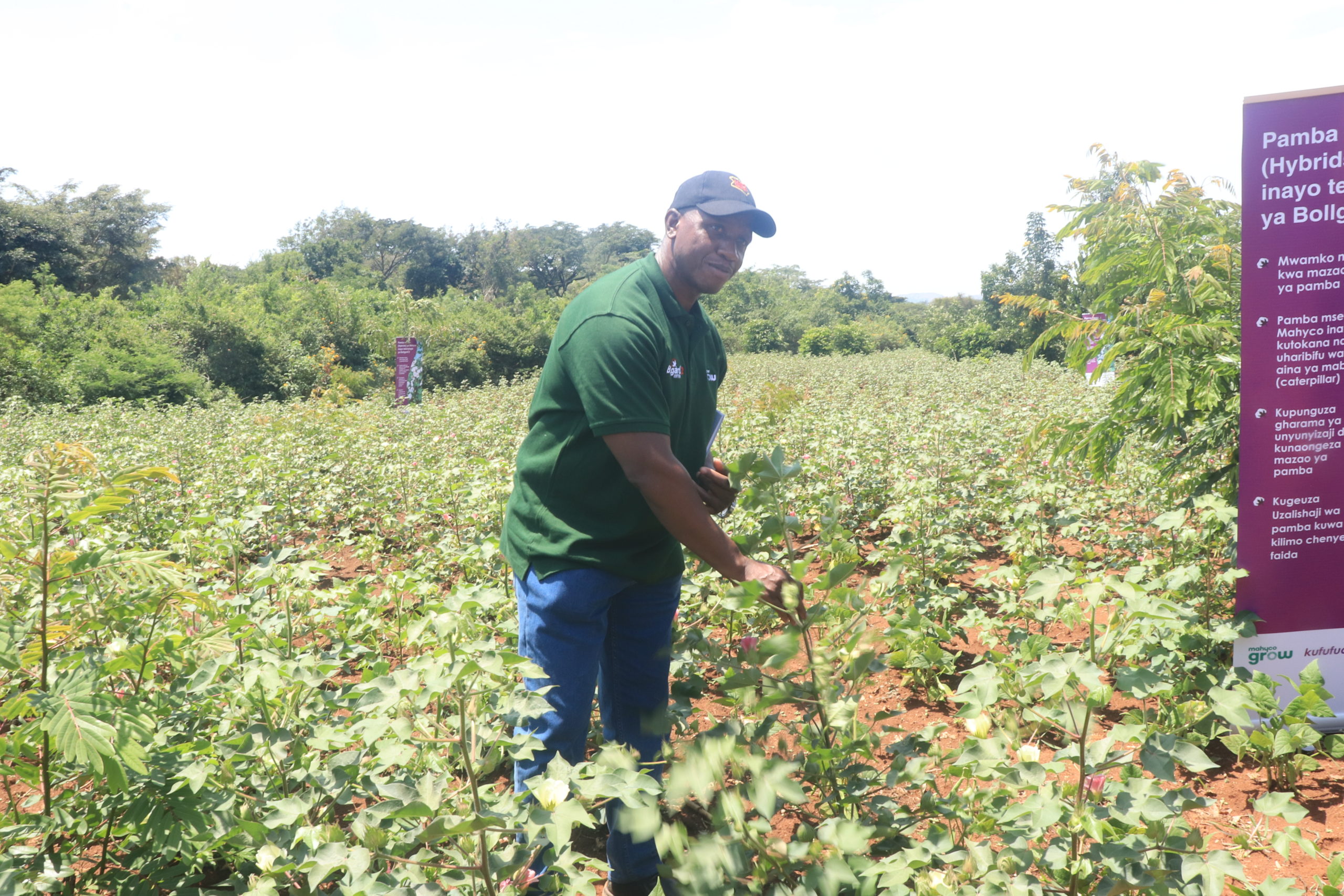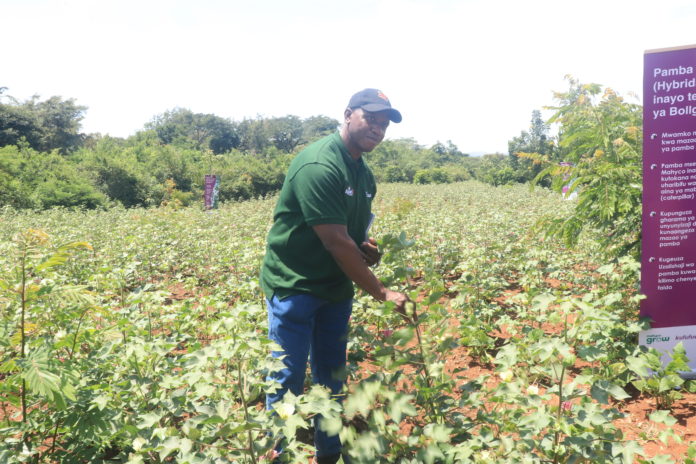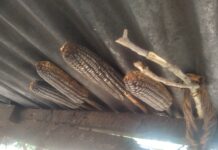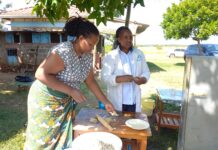By Okong’o Oduya
Busia County, Kenya: Cotton farmers in Busia County are optimistic about promising yields this year as compared to previous ones. Christopher Nduguli a cotton farmer in Bukiri, Samia Sub -County, reveals how the new variety they have planted this year is unique compared to the old variety.
According to him, if the variety is well-managed is capable of producing up to 80 bolls per plant.
During a recent trip field trip organized by agricultural experts, Christopher noted how the variety he used to plant cost him a lot in terms of spraying, weeding, and making sure that the crop is protected from worms and pests but was still in-effective.
Unlike the current variety, Nduguli says, up to its maturity he has only sprayed once with the purpose of killing aphids, which is rampant in the region but effective to bollworms.
“BT cotton variety is different from the old variety. I have realized it is resistant to drought. When I planted these seeds, there was no rain but it managed to germinate and it is doing well as you can see. I have also noticed that this variety can produce more than 80 bolls per plant if well managed.
“The only challenge I have seen affecting this variety is the frequent attack from the Aphids, I have tried to spread at least twice to kill them. I am sure this time around I will be able to get more than a ton,” he said.
Nduguli who has been planting cotton for the last 20 years says, last year he sprayed his plants more than 5 times to kill the worms and other pests but still he could not maximize the profit.
“Last year I sprayed more than 5 times in efforts to eradicate the bollworms and Aphids but still, I could not achieve anything. This time round I have sprayed only once I haven’t noticed any presence of bollworm,” he explained.
Francis Opailo is also a cotton farmer from Apegei in Teso South in Busia. He says the old variety could only produce a maximum of 20 bolls per plant, which affected them economically adding that the cost of production was more compared to the expenses.
“The current variety produces between 40 and 80 bolls per plant. I counted recently and there is a big difference between the old variety. I prefer this variety because it is more productive compared to the old variety.”

Last year I planted the old variety to an acre. I only produced 200kgs of cotton, but today I have planted half an acre and it will produce more than what I harvested last year.” He said.
Lwanda cotton farmers Cooperative union’s chairman Vincent Egesa, the various farmers in the region have opted to plant, will produce enough to supply to Mulwanda ginnery with enough raw material as soon it starts working later this year.
“We received two types of cotton seeds, (hybrid and BT cotton), and those who planted in May this year are already harvesting. The two varieties are doing well compared to the KSA81M variety we used to plant. If well taken care of per acre a farmer can harvest up to 1.5 tons of cotton, more promising than the old variety.
He says the union has more than 4000 members who are able to produce enough cotton to sell to the ginnery.
“4,000 farmers that comprise the union will be able to produce enough cotton to feed the ginnery at the initial stage. With 2,000 bales for a start will be able to keep the gin running as we increase the supply.” He said.
Dr. Charles Waturu is the lead scientist in cotton BT’s research says BT cotton variety is the best for the farmers. He reveals that the number of bolls per plant is appealing bringing which will bring back hope to the cotton industry in Kenya.
“This is the true color of BT cotton. You see the plant has got bolls right from the bottom of the plant to the top of the plant. The other variety you could not see bolls at the bottom, it could have been wiped out by bollworm, but because the BT cotton variety is immune against the bollworm, the plant is well stocked with bolls, he said.
He says the number of bolls realized from the fields is almost the same they arrived at during the research of more than 40 bolls per plant and the cotton is white without any stains.” He noted
In terms of germination, Dr. Waturu said the variety had up to 90 percent in terms of germination adding that the other variety had 40-45 germination percentages.
He advised farmers to avoid interplanting beans with the cotton saying that doing so encourages pests and may at some point be attacked by bollworms which may require more resources to manage.
He asked those tasked to supply cotton seeds to avail them to farmers on time adding that from the demonstration farms, the variety has proved to be effective.
According to him, by 2018 Kenya was producing 10,000 tons of bales locally compared to the demand for 140,000 tons of bales forcing the country to import shortage from other countries such as Uganda and Ethiopia
Darlington Mutetwa from Mahyco Seed Company in Kenya, the suppliers of cotton planting seed says the performance of BT and hybrid variety is more appealing and promising to the cotton industry in Kenya.
He adds that the seeds are already in the country and are in the process of establishing links with agro-dealers in all areas where the cotton is going to be grown for easy accessibility to farmers whenever they need them.
“We have the seeds in the country as I speak; we are in the process of establishing some linkages with some dealers in the country, to make seeds available conveniently to the farmer whenever they want the seeds they should be able to access the seed from their county,” he said.
He noted that they are in negotiation with KARLO to start some trials to capacity build farmers to start producing hybrid seeds locally to let the farmers be aware of what is involved in the production of hybrid cotton seeds, adding that as a company they will not be importing more seeds into the country.
“We are already in discussions with KALRO to start some trials where we will start capacity building amongst the Kenyan farmers so that they are able to produce hybrid seeds locally. As a company, we don’t think we will be importing these seeds in the future. We want to have farmers able to produce these seeds,” he said
Dr. Margaret Karembu the Director of ISAAA AfriCenter says, there is a need for farmers to be educated on the importance of venturing into BT cotton farming to demystifying information that the variety is dangerous to their farms.
“We have realized farmers have been misinformed on BT cotton that is why as researchers we need to meet farmers and let them know the real information on how to grow BT cotton variety.
If we don’t do that, many farmers will plant without following the laid down procedures contributing to poor farm produce then end up blaming the technology,” she noted
7 countries in Africa are among 15 countries globally that have adopted BT cotton farming adding that Kenya is among the countries that have legalized BT cotton variety after, South Africa, Sudan, Ethiopia, Nigeria, and Malawi.














